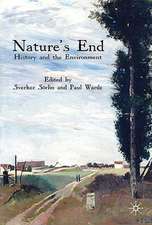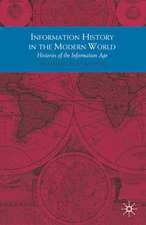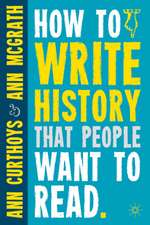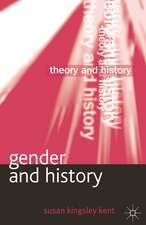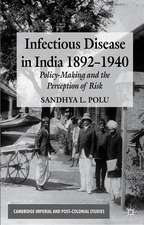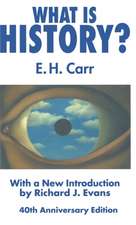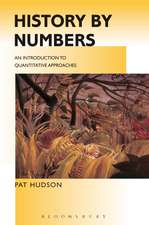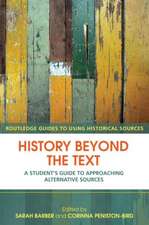Palgrave Handbook of Research in Historical Culture and Education
Editat de Mario Carretero, Stefan Berger, Maria Greveren Limba Engleză Hardback – 20 mar 2017
Preț: 2298.77 lei
Preț vechi: 2803.37 lei
-18% Nou
Puncte Express: 3448
Preț estimativ în valută:
439.86€ • 460.49$ • 363.96£
439.86€ • 460.49$ • 363.96£
Carte tipărită la comandă
Livrare economică 07-21 aprilie
Preluare comenzi: 021 569.72.76
Specificații
ISBN-13: 9781137529077
ISBN-10: 1137529075
Pagini: 810
Ilustrații: XXIII, 856 p. 8 illus., 1 illus. in color.
Dimensiuni: 155 x 235 x 57 mm
Greutate: 14.3 kg
Ediția:1st ed. 2017
Editura: Palgrave Macmillan UK
Colecția Palgrave Macmillan
Locul publicării:London, United Kingdom
ISBN-10: 1137529075
Pagini: 810
Ilustrații: XXIII, 856 p. 8 illus., 1 illus. in color.
Dimensiuni: 155 x 235 x 57 mm
Greutate: 14.3 kg
Ediția:1st ed. 2017
Editura: Palgrave Macmillan UK
Colecția Palgrave Macmillan
Locul publicării:London, United Kingdom
Cuprins
Acknowledgements
List of Contributors
1 Introduction: Historical Cultures and Education in Transition
Mario Carretero, Stefan Berger, Maria Grever
Part I Historical Culture: Conceptualizing the Public Uses of History
2 History Writing and Constructions of National Space - The Long Dominance of the National in Modern European Historiographies
Stefan Berger
3 Historical Consciousness and Historical Thinking
Peter Seixas
4 Historical Culture: a Concept Revisited
Maria Grever and Robbert-Jan Adriaansen
5 Historical Rights to Land: How Latin American States Made the Past Normative and What Happened to History and Historical Education as a Result
Tamar Herzog
6 ’The Times They Are a-Changin’. On Time, Space and Periodization in History
Chris Lorenz
7 Democracy and History Museums. Museo de America
Marisa González de Oleaga
8 Illustrating National History
Peter Burke
9 Film, the Past, and a Didactic Dead End: From Teaching History to Teaching Memory
Wulf Kansteiner
10 Historical Edutainment: New Forms and Practices of Popular History?
Barbara Korte and Sylvia Palatschek
11 The Jurassic Park of Historical Culture
Antonis Liakos and Mitsos Bilalis
Part II The Appeal of the Nation in History Education of Postcolonial Societies
12 Teaching National History to Young People Today
Jocelyn Letourneau
13 Echoing National Narratives in English History Textbooks
Tina van der Vlies
14 Colonial and Postcolonial Contexts of History Textbooks
Susan Grindel
15 History in French Secondary School: a Tale of Progress and Universalism or a Narrative of Present Society?
Nicole Tutiaux-Guillon
16 National Narratives and the Invention of Ethnic Identities in Morocco
Norah Karrouche
17 Constructing Identity and Power in History Education in Ukraine: Approaches to Formation of Peace Culture
Karina V. Korostelina
18 Postcolonial Discourses and Teaching National History. The History Educators' Attempts to Overcome Colonialism in the Republic of Korea
Sunjoo Kang
19 History for Nation-Building: the Case of Greece and Turkey
Herculas Millas
20 Conflicting Narratives about Argentinean "Conquest of the Desert". Social Representations, Cognitive Polyphasia, and Nothingness
Alicia Barreiro, José Antonio Castorina, Floor van Alphen
21 After Empire: the Politics of History Education in a Postcolonial World
Andrew Mycock
Part III Reflections on History Learning and Teaching
22 What to Teach in History Education When the Social Pact Shakes?
Alberto Rosa and Ignacio Bresco
23 The Power of Story: Historical Narratives and the Construction of Civic Identity
Helen Haste and Ángela Bermúdez
24 Shared Principles in History and Social Science Education
Keith Barton
25 Concepts Acquisition and Conceptual Change in History
Maria Rodriguez-Moneo and Cesar Lopez
26 Social Representations Concepts of the Past and Competences in History Education
Dario Páez, Magdalena Bobowik and James Liu
27 Teaching History Master Narratives: Fostering ImagiNATIONS
Mario Carretero
28 Organizing the Past: Historical Accounts, Significance and Unknown Ontologies
Lis Cercadillo, Arthur Chapman and Peter Lee
29 Historical Reading and Writing in Secondary School Classrooms
Jeffrey Nokes
30 Engaging Students in Historical Reasoning: the Need for Dialogic History Education
Carla van Boxtel and Jannet van Drie
Part IV Educational Resources: Trends in Curricula, Textbooks, Museums and New Media
31 Bridging the Gap - Comparing History Curricula in History Teacher Education in Western Countries
Nicola Brauch
32 Cultural Wars and History Textbooks in Democratic Societies
Tony Taylor and Stuart Macintyre
33 Trends and Issues Surrounding the Reading of Historical Texts in the Republic of Korea
Hohwan Yang
34 History Education Reform in Twenty-First Century China
Side Wang, Yueqin Li, Zhongjie Meng and Chencheng Shen
35 Tools in Teaching Recent Past Conflicts. Constructing Textbooks beyond National Borders
Robert Maier
36 Emotional, Moral and Symbolic Imagery of Modern Russian History Textbooks
Tatyana Tsyrlina and Michael Lovorn
37 Educational Websites on the Memory of Slavery in Europe: the Ongoing Challenge of History Teaching
Stephan Klein
38 Social Media, New Technologies and History Education
Terry Haydn and Kees Ribbens
39 The Neverending Story about Heritage and Museums: Four Discursive Models
Mikel Asensio and Elena Pol
Index
Notă biografică
Mario Carretero is Professor at Autonoma University of Madrid, Spain, where he was Dean of the Faculty of Psychology, and Researcher at FLACSO, Argentina. He has carried out an extensive research on history education. His last two books are History Education and the Construction of National Identities (2012) (co-ed.) and Constructing Patriotism (funded by the Guggenheim Foundation) (2011).
Stefan Berger is Director of the Institute for Social Movements at the Foundation Library of the Rhur University-Bochum, Germany. His research interests are modern and contemporary european history, especially of Germany and Britain, comparative labour history, nationalism and history of historiography. He has published The Contested Nation (2011) and Nationalizing the Past (2010).
Maria Grever is Professor of History and Theory and Director of the Center for Historical Culture at Erasmus University Rotterdam, the Netherlands. She has published widely on canonization processes, historical culture, collective memory and identity, heritage and history education. Currently she leads the research program War! Popular Culture and European Heritage of Major Armed Conflicts (2015-2019).
Stefan Berger is Director of the Institute for Social Movements at the Foundation Library of the Rhur University-Bochum, Germany. His research interests are modern and contemporary european history, especially of Germany and Britain, comparative labour history, nationalism and history of historiography. He has published The Contested Nation (2011) and Nationalizing the Past (2010).
Maria Grever is Professor of History and Theory and Director of the Center for Historical Culture at Erasmus University Rotterdam, the Netherlands. She has published widely on canonization processes, historical culture, collective memory and identity, heritage and history education. Currently she leads the research program War! Popular Culture and European Heritage of Major Armed Conflicts (2015-2019).
Textul de pe ultima copertă
This volume comprises a broad interdisciplinary examination of the many different approaches by which contemporary scholars record our history. The editors provide a comprehensive overview through thirty-eight chapters divided into four parts: a) Historical Culture and Public Uses of History; b) The Appeal of the Nation in History Education of Postcolonial Societies; c) Reflections on History Learning and Teaching; d) Educational Resources: Curricula, Textbooks and New Media. This unique text integrates contributions of researchers from history, education, collective memory, museum studies, heritage, social and cognitive psychology, and other social sciences, stimulating an interdisciplinary dialogue. Contributors come from various countries of Northern and Southern America, Europe and Asia, providing an international perspective that does justice to the complexity of this field of study. The Palgrave Handbook of Research in Historical Culture and Education provides state-of-the-art research, focussing on how citizens and societies make sense of the past through different ways of representing it.
Caracteristici
A comprehensive guide to contemporary historical scholarship and its relation to public issues
Explores education, collective memory, heritage and different kinds of historical representations
Speaks to historians, educators, museum curators and cultural agents
Explores education, collective memory, heritage and different kinds of historical representations
Speaks to historians, educators, museum curators and cultural agents

